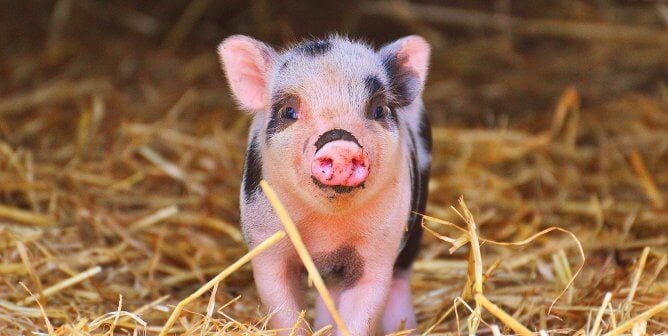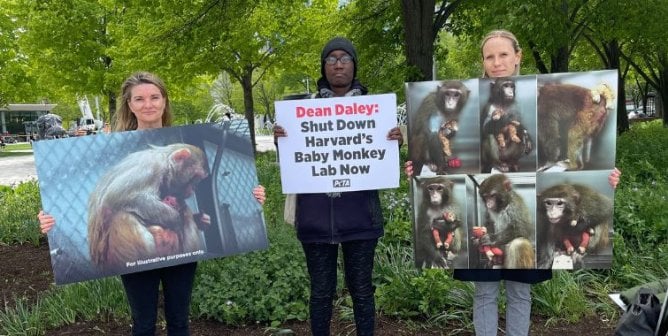Covance
Covance is a multibillion-dollar company that uses animals to test everything from drugs to industrial chemicals and cosmetics ingredients for client companies. As a contract testing facility, Covance is essentially a laboratory for hire that’s willing to conduct just about any test on any animal for the right price. It’s also the largest importer of nonhuman primates into the U.S., bringing in thousands of monkeys who have been taken from their forest homes in Mauritius or bred on cramped, barren confinement facilities in Southeast Asia—where monkeys are reportedly “kept in virtual starvation, exacerbated by the hierarchies formed within the cages.” Witnesses report that “the older males hoard food and the rest fight, often to the death, for the scraps.”
In 2017, Covance used 7,042 nonhuman primates in cruel and often deadly tests and imprisoned an additional 1,370 nonhuman primates for other purposes, including breeding. The company administers test compounds to monkeys via a thick plastic tube called a gavage, which is forced up their nostrils or down their throats. Depending on the specific test, dosing may be done daily for more than a year. As the monkeys sicken from the test compound, they may suffer from numerous ill effects—but they receive no veterinary care, as this could interfere with the objectives of the tests. As is always the case with animal experimentation, the wishes of the experimenters are placed above the basic needs and interests of the animals.
But animals at Covance don’t suffer only as a consequence of the horrifying tests in which they’re used. The company has repeatedly been cited for violations of federal animal-welfare laws. Federal inspectors found that a primate’s leg became trapped in his cage, leaving him unable to reach food or water, yet employees failed to notice his plight for days. Nearly a month later, inspectors found that primate cages were still unsafe and could “result in entrapment or animal injury.” Covance also failed to offer veterinary care to monkeys who had sustained limb fractures and suffered from hair loss and diarrhea and failed to handle monkeys humanely, resulting in serious orthopedic injuries.
In March 2012, Covance was cited for housing a monkey in isolation for nearly eight months, with no explanation for why this animal was being denied companionship. In February 2012, the U.S. Department of Agriculture (USDA) cited the company when a monkey died after getting entangled in an “enrichment” device in his cage. In June 2011, inspectors concluded that outdoor cages were so woefully inadequate that monkeys suffered from frostbite each winter during frigid weather. Covance has neglected to offer enrichment for primates so traumatized by laboratory life that they exhibited abnormal behavior. A federal inspector witnessed a monkey in so much distress that he ceaselessly paced in backward circles inside his cage.
In 2016, the USDA fined Covance $31,500 after 13 macaque monkeys died of hyperthermia in two separate incidents in which no one noticed that thermostats had malfunctioned, causing the rooms to overheat. For nearly a year, a PETA eyewitness worked in a laboratory owned by Covance and documented that workers there struck, choked, and screamed at terrified monkeys. In addition, they slammed primates into cages and sprayed them with pressurized hoses. As a result, the company was fined $8,720. To a multibillion-dollar corporation like Covance, these fines are the equivalent of pocket change found between couch cushions.




